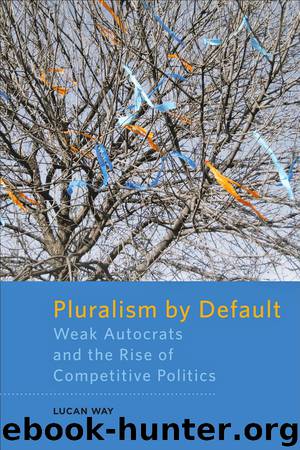Pluralism by Default by Lucan Way

Author:Lucan Way
Language: eng
Format: epub
Publisher: Johns Hopkins University Press
Published: 2015-07-13T16:00:00+00:00
Belarus’s Transition to a Closed Regime
Immediately after coming to power, Lukashenka aggressively censored state media, closing Belarus’s only independent radio station and several independent newspapers, including Svaboda, the main nationalist paper that had been operating since 1990. Nevertheless, during this period, Lukashenka lacked full control over key institutions, giving opposition important opportunities to resist his efforts to monopolize power. The courts maintained autonomy, and “the machine of mass falsification and administrative pressure had not yet been fully constructed.”104 In addition, state cohesion was still relatively low, and opposition continued to have some access to television. With no organization of his own or experience in government, Lukashenka was forced to appoint ministers with whom he had very weak ties.105 Lukashenka had limited capacity to engage in high-intensity coercion and therefore was vulnerable to any serious opposition threat.106 Indeed, Lukashenka openly admitted in a speech before officers in 1995 that he did “not trust the central apparat of the KGB.”107
What saved Lukashenka during this period was the absence of a powerful anti-incumbent identity that deprived the opposition of sufficiently passionate and widespread support to make large-scale coercion necessary. Lukashenka instead used Belarus’s unified national identity to bludgeon opposition. In 1995, Lukashenka called a referendum to make Russian an official language, replace the new Belarusian national flag with older Soviet-era symbols, and strengthen economic integration with Russia. Belarusian nationalists strenuously opposed such measures, which touched on the core of BPF anti-Soviet identity. Announcing that they were “ready for any radical action,” about fifteen BPF politicians called a hunger strike and holed themselves up in parliament. “The opposition demonstrated its moral strength.”108
The problem was that while anti-Russian nationalism motivated a small core of activists, it lacked sufficiently broad support to threaten the government. Lukashenka “could not have chosen a better disagreement over which to fight the opposition.”109 Supporters of the hunger strike were few enough in number that Lukashenka was able to quickly evacuate them from the parliament building on the pretext of a bomb scare—physically attacking some parliamentarians in the process.110 The comparatively mild violence “scared the rest of parliament to such a degree” that deputies quickly decided to support the president’s referendum.111 In turn, Lukashenka’s pro-Russian/Soviet referendum passed overwhelmingly—with 83 percent supporting closer ties to Russia and making Russian an official language, and 75 percent in favor of the replacement of the Belarusian national emblems with the Soviet-era symbols.
Even more critically, not a single BPF politician won a seat to the new legislature in elections that were widely considered to be free of serious fraud.112 Advocating a national position unacceptable to most Belarusians, the BPF suffered a “profound defeat.”113
The legislature, consisting of just a few die-hard opposition members, was dominated by leftist deputies and overwhelmingly sought peaceful cooperation with the president (a stark contrast to Moldova and Ukraine at that time). The new speaker, Semion Sharetskii, a “cautious” former collective farm chairman, initially did “everything so as not to antagonize Lukashenka.”114
Yet Lukashenka did not reciprocate—refusing to show minimal deference to the legislature and openly violating the law.
Download
This site does not store any files on its server. We only index and link to content provided by other sites. Please contact the content providers to delete copyright contents if any and email us, we'll remove relevant links or contents immediately.
| Anthropology | Archaeology |
| Philosophy | Politics & Government |
| Social Sciences | Sociology |
| Women's Studies |
The Secret History by Donna Tartt(19088)
The Social Justice Warrior Handbook by Lisa De Pasquale(12190)
Thirteen Reasons Why by Jay Asher(8909)
This Is How You Lose Her by Junot Diaz(6886)
Weapons of Math Destruction by Cathy O'Neil(6279)
Zero to One by Peter Thiel(5802)
Beartown by Fredrik Backman(5754)
The Myth of the Strong Leader by Archie Brown(5507)
The Fire Next Time by James Baldwin(5444)
How Democracies Die by Steven Levitsky & Daniel Ziblatt(5218)
Promise Me, Dad by Joe Biden(5153)
Stone's Rules by Roger Stone(5087)
A Higher Loyalty: Truth, Lies, and Leadership by James Comey(4963)
100 Deadly Skills by Clint Emerson(4925)
Rise and Kill First by Ronen Bergman(4788)
Secrecy World by Jake Bernstein(4753)
The David Icke Guide to the Global Conspiracy (and how to end it) by David Icke(4718)
The Farm by Tom Rob Smith(4509)
The Doomsday Machine by Daniel Ellsberg(4490)
